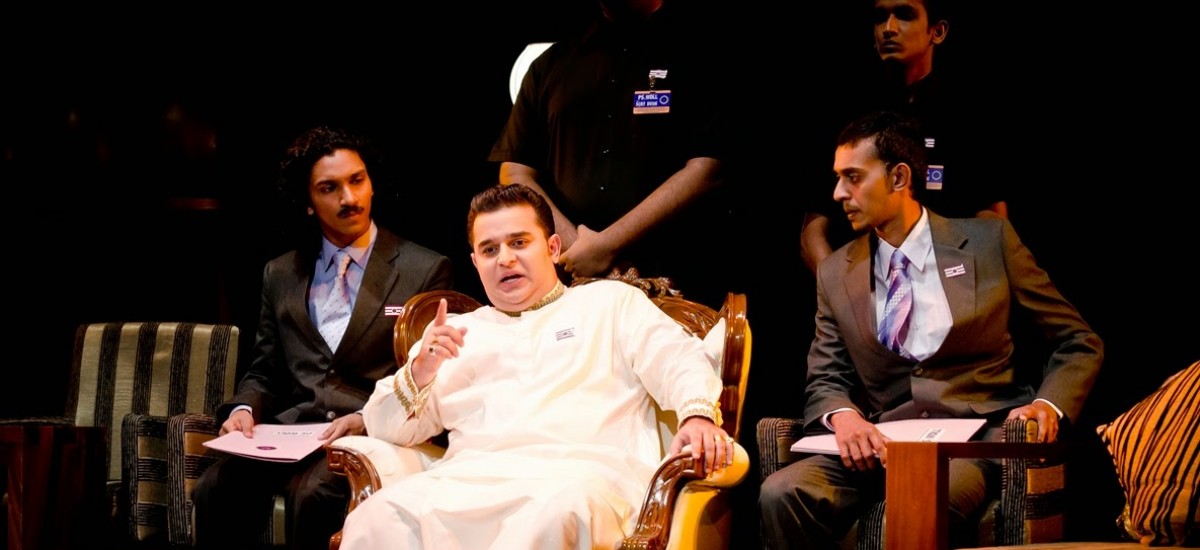We have grown to either love or hate the Pusswedilla franchise. Most relish it as high (even low) entertainment with the added thrill of political parody. Some dismiss it as poor satire. I propose to do no such thing—simply because Pusswedilla only masquerades as satire. It is the Trojan horse of Sri Lankan theatre.
Why the political establishment has supported this franchise has puzzled me for some time. There are some obvious theories. We might say Sri Lankans, including Sri Lankan politicians, ‘enjoy a good laugh’, even at their own expense. We might think that the government wants to showcase freedom of expression, and a relatively harmless political satire serves the purpose. We might even speculate that there is added pressure to appease Pusswedilla fans, as the franchise has grown so popular. These explanations have merit. Yet, the question continued to vex me.
The audience
A typical Pusswedilla audience does not naturally gravitate towards political commentary. If ‘apolitical’ is too strong a description, perhaps ‘indifferent’ might be appropriate. Over time, the Pusswedilla writers have discovered this audience and have worked out a winning formula. They know they must be faithful to this formula to keep their audience faithful to the franchise. They are right. And no one should question the economics of it.
Why then is Pusswedilla so dangerous?
An antidote and morphine
Apologists may argue that Pusswedilla provides a rare opportunity for the politically indifferent to reflect on the country’s political culture. Of course, this is precisely what satire should do. We already know that Pusswedilla does not always succeed in this venture. Yet we credit it for trying. There is, however, a delicate difference between satire and the Pusswedilla franchise.
A satire is like an experimental antidote. It attempts to encourage some form of resistance. It aims to make audiences less comfortable with their poison—their reality. Bakamoona Veedi Basi is a classic example of satire. It uses an allegorical platform to convey a message about the cost of societal compromises. The play makes audiences uncomfortable with the price they may have paid for peace. A good satire therefore leaves its audience entertained, yet disturbed and contemplating change. Many who witnessed AnandaDrama’s outstanding Grease Yaka or Sashane Perera’s powerful version of Men without Shadows will know precisely this feeling. I would not grudge Pusswedilla if it tries and fails in such a pursuit. But Pusswedilla does precisely the opposite of satire.
Pusswedilla is like a dose of morphine. Audiences are offered a coping mechanism—some comic respite from an otherwise distasteful political reality. But Pusswedilla avoids subtlety. It immerses its audiences directly into a very obvious imitation of their reality. As pointed out by Hafeel Farisz in an excellent review of the most recent edition of Pusswedilla, it is like watching Mervyn Silva on a rampage. The trouble is, Mervyn Silva is a real politician. If art imitates life too accurately, and without an accompanying critique, we are only left with a version of reality repackaged for easier consumption. Audiences then leave the theatre a little less outraged by reality—a little less prone to change. There is another word for this type of expression.
If we can laugh with him, we can live with him
Hints of something insidious are most evident in the characterisation of the main protagonist—a thinly disguised avatar of the President. Pusswedilla himself is dubiously endearing; it helps to cast the uniquely brilliant Dominic Kellar in the role. Amidst the comical incompetence and depravity around him, he stands out as sensible and strangely appealing. He routinely outwits his friends and foes (obvious avatars of government and opposition politicians), and reaffirms why he is the best of the bad lot—in his own words, ‘the only ace in a pack of jokers’. We never quite laugh at him—only with him. In a painfully unsubtle rendition of the actual Pusswedilla censorship episode, the character even defends so-called satire. He cheekily reminds us who defended the franchise when a humourless censorship board momentarily shut it down. In the process, Pusswedilla ceases to be critical of the current political dispensation—it credits its very existence to the powers that be.
Good politicians usually have good instincts when it comes to knowing what to permit and what to censor. It is clear that Pusswedilla serves purposes that proponents of the status quo deem useful. Amongst the obvious purposes lies a more insidious aim—keeping the politically indifferent in their place. For without them, the rabble-rousers are too few to matter.
Discomfort precedes change
Pusswedilla offers its audiences a chance to laugh at the state of politics from the comfort of their grammatically correct, perfectly pronounced, English-speaking high horses. But the only steed at a Pusswedilla show is a Trojan. For laughter is not the only medicine being peddled. To recall a sharp metaphor used in Mind Adventures’ political satire Paraya, Pusswedilla also administers Upekka, the compliance-inducing drug.
Perhaps unbeknown to the cast and audience, Pusswedilla is damaging our political culture even further. Instead of compelling audiences to question the absurdity of their reality, Pusswedilla encourages them to accept the current political dispensation as the best on offer. This is dangerous because there can be no change without discomfort. Pusswedilla is no longer failed satire. It is cleverly packaged propaganda.

